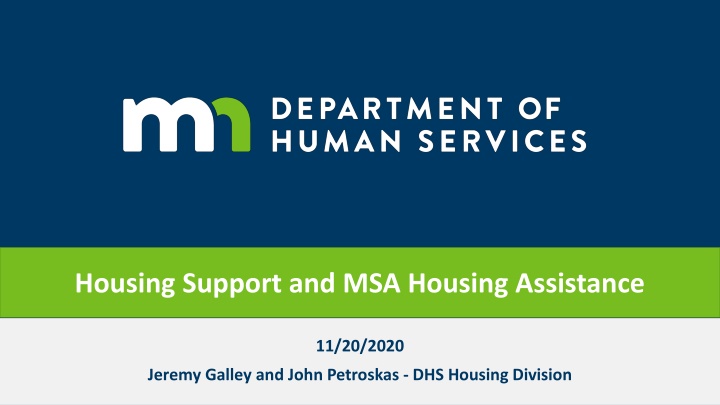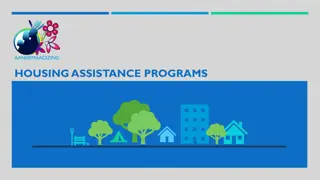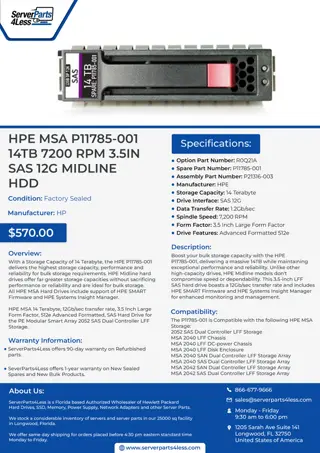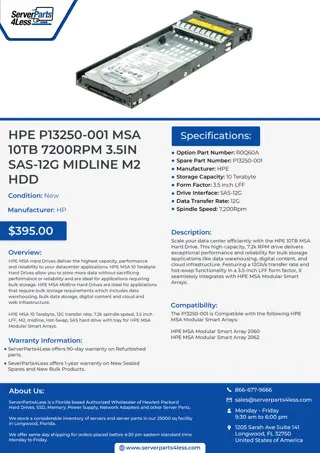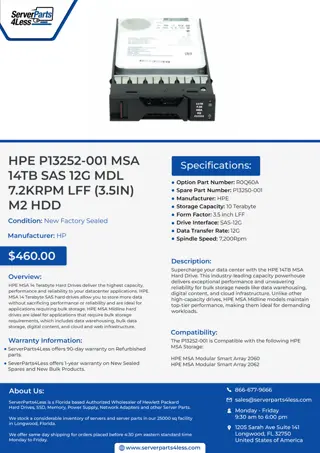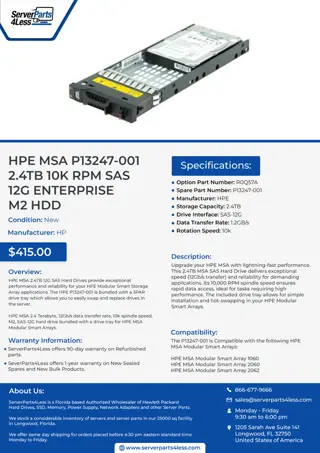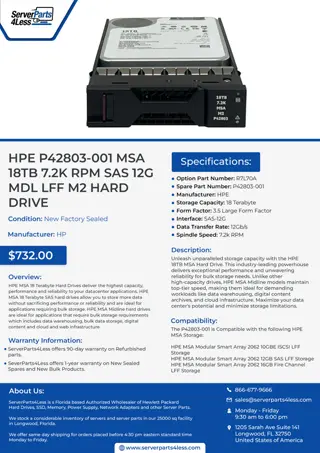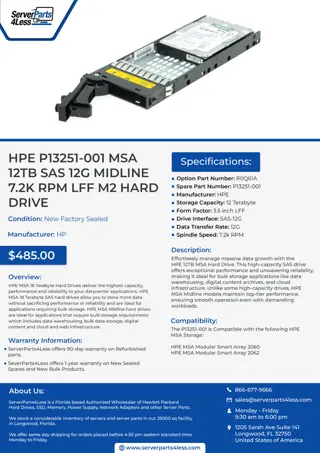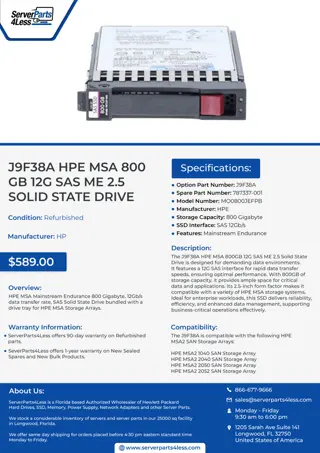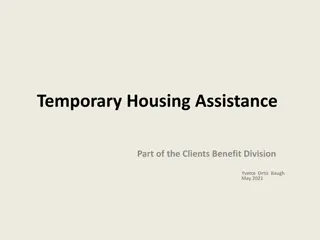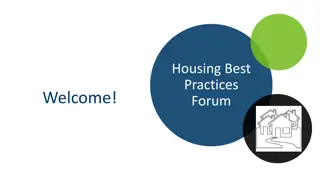Housing Support and MSA Housing Assistance
Thermal conductivity gauges measure pressure by analyzing changes in temperature due to heat conduction in enclosed gas. Different types of gauges like Pirani and Thermocouple gauges work on the principle of thermal conductivity. The gauges operate based on the dependency of heat transfer on pressure. Understanding the working principles and limitations of these gauges is essential for accurate pressure measurement in varied pressure ranges.
Download Presentation

Please find below an Image/Link to download the presentation.
The content on the website is provided AS IS for your information and personal use only. It may not be sold, licensed, or shared on other websites without obtaining consent from the author.If you encounter any issues during the download, it is possible that the publisher has removed the file from their server.
You are allowed to download the files provided on this website for personal or commercial use, subject to the condition that they are used lawfully. All files are the property of their respective owners.
The content on the website is provided AS IS for your information and personal use only. It may not be sold, licensed, or shared on other websites without obtaining consent from the author.
E N D
Presentation Transcript
Housing Support and MSA Housing Assistance 11/20/2020 Jeremy Galley and John Petroskas - DHS Housing Division
DHS resources in context Services Housing Self-pay Income supplements Public Housing Authority Vouchers Section 8 (Housing Choice Voucher) Bridges and Bridges RTC Housing Trust Fund rental assistance Family Unification Program Project-based Section 8 HUD Homeless programs Housing Trust Fund rental assistance Supportive Housing LTHSS HUD Homeless programs Housing Support Supplemental Services (LTH and non-LTH) Housing Support MSA Housing Assistance Personal Care Assistant (PCA) Waiver Programs Mental Health Targeted Case Management Assertive Community Treatment ARMHS Grant funded supports (PATH / HSASMI) Housing Stabilization Services (7/2020) Life Factors Income / Assets Housing stability Disability status Living situation Preferences Service need
Housing Support Basics State of Minnesota pays the rest. Max Rate People pay their countable income.
Housing Support Basics 100% state-funded income support to pay for housing expenses, and sometimes additional services Always Room and Board, up to $934 per month (20,000 people) Starting 7/1/2020 Sometimes Supplemental Services, $482.84, or higher if approved by legislature (5,800 people)
Housing Support Basics People have to apply Combined Application Form (DHS-5223) OR Change Report Form (DHS-2402) if a person is open on a cash assistance program already, OR Online (applymn.org). People may have to apply for other programs like SSI or RSDI. Call Disability Hub for SOAR/SSI advocate connection: 866-333-2466 Good cause exceptions People need to report changes within 10 days. People can be absent and not lose housing. 18 days at a time, up to 60 days per year.
Housing Support Group Setting No Income Housing Support providers must ensure every recipient has: food preparation and service for three nutritional meals a day on site a bed clothing storage linens/bedding laundry supplies or service housekeeping lavatory supplies or service maintenance and operation of the building and grounds $194 Person gets $104 GA income as a monthly personal needs allowance Authorized Provider $104 (DHS) $740 $934 (DHS) State = $934 Housing Support Room and Board = $934 Housing Support Room and Board
Housing Support Community Setting No Income Housing Support providers must ensure every recipient has: County or Tribe authorizes $194 SNAP food preparation and service for three nutritional meals a day on site a bed clothing storage linens/bedding laundry supplies or service housekeeping lavatory supplies or service maintenance and operation of the building and grounds General Assistance Utilities and other Household Needs $174 $0 Authorized Provider $104 $760 (Eff.) $934 (Room and Board) $483 Housing Support (Services if LTH) = $934 Housing Support Room and Board = $934 Housing Support Room and Board 7
Housing Support Basics Three things have to be true: Eligible person Eligible provider Eligible place
Eligible Person Must have low income and assets Adults age 65 or older, or adults age 18 or older with a certified disability or disabling condition that prevents work to the level of self-support
Eligible Person Countable Income must be less than maximum benefit Assets must be less than $10,000 People should stay aware of asset limits for other programs (SSA, MA)
Eligible Person Basis of eligibility = verified reason Elderly 65 and up Certified Disability (SSI, RSDI, SMRT) Disabling Condition (some GA conditions) Verified by qualified professional or county designee Transitioning from Residential Treatment Housing instability verified by residential behavioral health treatment staff
New Housing Support Basis of Eligibility: Transition from Residential Treatment Residential Behavioral Health Treatment Transition from Residential Treatment Longer Term or Permanent Traditional Housing Support in same location if eligible. Eligibility: Up to 3 benefit months OR when person leaves. First month could be partial. No income or assets Need to be technically eligible. No interview unless needed to verify something. Documented housing instability when leaving treatment (Professional Statement of Need) Connect to Housing Support provider Apply for Housing Support Traditional Housing Support in different location if eligible. No Housing Support
Professional Statement of Need (PSN) Professional Statement of Need (PSN) New elements to streamline eligibility for programs and services. Housing Support Program eligibility for people without certified disability Supplemental Service Rate eligibility New Transition from Residential Treatment basis Housing Stabilization Services New MA state-plan service to help people with disabilities find and keep housing.
Talking with people about Housing Support I m not allowed to work while I m receiving Housing Support . OR I have to give up all of my job income . People can work and keep over half of their job income while receiving Housing Support!
Housing Support and Work New asset limit of $10,000 SSI recipients still follow SSI rules New earned income calculation for non- SSI recipients Disregard the first $65, then keep half of the rest New earned income reporting requirements Most people report earned income every six months and keep increases during that time.
Housing Support and Work Not Working Working Some Working More Monthly Gross Earned Income $0.00 $275.00 $2139.00 Earned Income Disregard: First $65 -$0.00 $0.00 $0.00 -$65.00 $210.00 -$105.00 -$65.00 $2074.00 -$1037.00 remaining Countable Earned Income $0.00 $105.00 $1037.00 Personal Needs Allowance $104.00 -$104.00 -$104.00 Amount Resident Pays $0.00 $1.00 $933.00 State Housing Support payment $934.00 $933.00 $1.00 Resident s Available Cash $104.00 $274.00 $1206.00
Housing Support Community Setting Job Income only Housing Support providers must ensure every recipient has: County or Tribe authorizes $194 SNAP Person keeps $399 of income for monthly personal needs allowance food preparation and service for three nutritional meals a day on site a bed clothing storage linens/bedding laundry supplies or service housekeeping lavatory supplies or service maintenance and operation of the building and grounds Earned Income Utilities and other Household Needs $174 $525 $126 Authorized Provider $760 (Eff.) $808 (Room and Board) $483 Housing Support (Services if LTH) = $934 Housing Support Room and Board = $934 Housing Support Room and Board 17
Eligible Provider Counties or tribes sign standardized Housing Support agreement with providers. Group or community versions Updated annually Non-transferable Sets standards Authorizes provider capacity Establishes rates
Eligible Provider Room and board standards (for everyone receiving Housing Support) three nutritional meals a day a bed, clothing storage, linen, bedding, laundry supplies housekeeping maintenance and operation of the building and grounds
Eligible Provider Supplemental Service Rate standards (in addition to room and board for about 25% of recipients) connect people with resources for identified needs case notes general oversight and supervision arranging for medical and social services assist with transportation other if required by legislature
Not a provider yet? Prospective Housing Support Providers need to: 1. Read the Housing Support agreement 2. Contact the right person at the county or tribe 3. Follow county or tribal process
Housing Support Places Two types of places: Group Settings Meals must be provided. Community-based Settings People have their own lease and have the option to prepare their own meals. Every place has to be: Licensed or registered, OR Tribally authorized, OR Exempt in state law
Supportive Housing Habitability inspection for each unit People in Long Term Homeless programs need: LTH verification form Documentation of referral from either Coordinated entry system, OR DHS approved direct access program
Talking with people about Housing Support How can I find a Housing Support provider ? Tools Coordinated Entry may be required for some pathways DHS direct access pathways (usually targeted) Counties and tribes may have local expert Existing provider networks HB101 Places Hennepin Housing Key Housing Link Disability Hub
Talking with people about Housing Support Housing Support doesn t work for families . Families with an eligible adult can receive Housing Support!
Housing Support recipients who also receive MFIP pay $146 toward their housing expenses regardless of the size of their family. Families can use their remaining income to pay for housing costs that aren t covered by Housing Support. Housing Support for families receiving MFIP Housing Support recipients who also receive MFIP pay $146 toward Housing Support recipients who also receive MFIP pay $146 toward their housing expenses regardless of the size of their family. their housing expenses regardless of the size of their family. Families can use their remaining income to pay for housing costs that Families can use their remaining income to pay for housing costs that aren t covered by Housing Support. aren t covered by Housing Support. Family of One Family of Two Family of Three MFIP cash grant 350 537 632 Housing Grant 110 110 110 Person Pays 146 146 146 Remaining Income 314 501 596
Talking with people about Housing Support I don t want to give up my SSI . Housing Support may not be the best long-term fit. People can start with Housing Support and transition to MSA Housing Assistance
Stop Housing Support and Start MSA Housing Assistance Transition in context: Services Housing Self-pay Income supplements Public Housing Authority Vouchers Section 8 (Housing Choice Voucher) Bridges and Bridges RTC Housing Trust Fund rental assistance Family Unification Program Project-based Section 8 HUD Homeless programs Housing Trust Fund rental assistance Supportive Housing LTHSS HUD Homeless programs Housing Support Supplemental Services (LTH and non-LTH) Housing Support MSA Housing Assistance Personal Care Assistant (PCA) Waiver Programs Mental Health Targeted Case Management Assertive Community Treatment ARMHS Grant funded supports (PATH / HSASMI) Housing Stabilization Services (7/2020) Life Factors Income / Assets Housing stability Disability status Living situation Preferences Service need
MSA Housing Assistance Federal SNAP $783 SSI $81 $1256 MSA Self directed to personal expenses $392 State Housing Assistance (Special Needs Payment)
Minnesota Supplemental Aid (MSA) State-funded monthly cash supplement for some SSI recipients and low-income RSDI recipients 31,000 recipients, $37M program cost Must be over age 18 (unless blind), and: (1) Receiving any amount of SSI, or (2) Would receive SSI but for excess income (and over 65, blind, or disabled)
Supplemental Security Income (SSI) SSI is a federal cash assistance program for people who: Are elderly (over 65), blind, or disabled, and Have limited income and resources SSI is an entitlement program; RSDI (aka SSDI) is a disability insurance program 2020 SSI rates (Federal Benefit Rate or FBR): $783/month-individual ($794 on 1/1/2021) $1,175/month-couple ($1,191 on 1/1/2021) Some people get both SSI and RSDI benefits
Applying For Assistance People don t get MSA automatically when approved for SSI. They must apply for MSA: Online: https://applymn.dhs.mn.gov/ or Using the Combined Application Form (DHS-5223).Check the cash box on page 1 and sign/date.
Combined application - Question 24 3/2/2018 35
MSA benefits $783 SSI + $81 MSA $864 total Additional MSA special needs benefits can include: Representative payee fees ($25/month) Guardian/Conservator fees (up to $100/month) Special diets (if prescribed by doctor; amount varies)
MSA Housing Assistance Must be eligible for MSA and Be under age 65 when applying and Have monthly housing costs of more than 40% of gross monthly income Housing Costs = Rent and Utilities Gross monthly income does NOT include MSA benefits
MSA Housing Assistance and one of the following Relocating from an institution (hospital, nursing facility, RTC, ICF-DD or IRTS program); or Eligible for Personal Care Assistance (PCA) services; or Receiving waivered services; or Transitioning from Housing Support
MSA Housing Assistance $783 SSI + $81 MSA + $392 MSA Housing Assistance* $ 1,256 Total Income This is a 60% increase in income over SSI alone! Caveat: Any increase in MSA benefits may decrease SNAP benefits. The impact depends on many factors.
Scenario: Transition from Housing Support to MSA Housing Assistance I have a client on SSI who wants to transition from Housing Support to MSA Housing Assistance. What should I know? Plan ahead so there is no gap in funding. County needs AT LEAST one full month to turn HS off and MSA HA on. Is this client moving from a Housing Support facility (like a board and lodge) or are they transitioning in place (like in an LTH supportive housing program)? How much independent living experience does the client have? Will you continue to provide services? Is this client on a waiver or eligible for Housing Stabilization Services? Coordinate this carefully. Talk with the client s financial worker. Provide all verifications showing the client is eligible, up front. Can this client manage their finances appropriately, or will they need help? Stress the importance of budgeting. Communicate with the landlord so there are no surprises about changes in the way rent is paid, or by whom.
Contact DHS For Housing Support questions, contact: dhs.dhs.grh@state.mn.us For MSA Housing Assistance questions, contact: john.petroskas@state.mn.us
